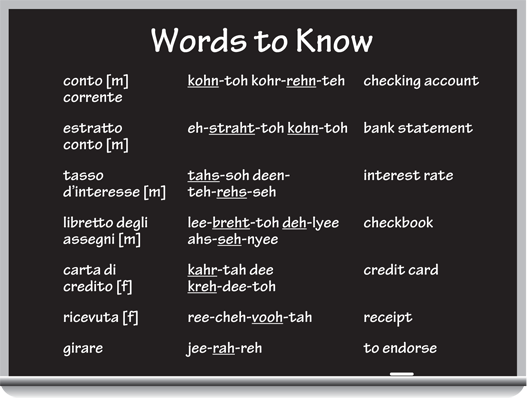Italian All-in-One For Dummies (78 page)
Read Italian All-in-One For Dummies Online
Authors: Consumer Dummies

Arriving and Leaving with Arrivare and Partire
When you use the verbs
arrivare
(ahr-ree-
vah
-reh) (
to arrive
) and
partire
(pahr-
tee
-reh) (
to leave
) in connection with specific places, certain prepositions accompany them. You always follow
arrivare
with the preposition
a
(ah) (
at/to/in
) when you're in a city; when you arrive in a country, you use the preposition
in
(een) (
in
). You always follow
partire
with the preposition
da
(dah) (
from
) when you're leaving a place behind; when leaving to go to a place, you follow it with the preposition
per
(pehr) (
for
).
You conjugate the verbs
partire
and
arrivare
like other regular
-are
and
-ire
verbs, which you can check out in
Chapter 1
of Book IV.
To help you understand how to use these verbs properly, here they are in some simple sentences:
Luca parte da Torino alle cinque.
(
looh
-kah
pahr
-teh dah toh-
ree
-noh
ahl
-leh
cheen
-kweh.) (
Luca leaves from Turin at 5 o'clock.
)
Arrivo a Taormina nel pomeriggio.
(ahr-
ree
-voh ah tah-ohr-
mee-
nah nehl poh-meh-
reej
-joh.) (
I'm arriving in Taormina in the afternoon.
)
Talkin' the Talk
 Filippo and Marzia are spending some time together before Filippo has to catch a plane. (Track 22)
Filippo and Marzia are spending some time together before Filippo has to catch a plane. (Track 22)
Marzia:
A che ora parte l'aereo?
ah keh
oh
-rah
pahr
-teh lah-
eh
-reh-oh?
What time does the plane leave?
Filippo:
Alle nove di mattina.
ahl
-leh
noh
-veh dee maht-
tee
-nah.
At nine a.m.
Marzia:
A che ora arrivi a Los Angeles?
ah keh
oh
-rah ahr-
ree
-vee ah lohs
ahn
-jeh-lehs?
What time will you arrive in Los Angeles?
Filippo:
Alle undici di notte.
ahl
-leh
oohn
-dee-chee dee
noht
-teh.
At eleven p.m.
Â
Using the Simple Future Tense
Sometimes you need a verb form that indicates that something will happen in the near future. In Italian, this tense is called
futuro semplice
(foh-
tooh
-roh
sehm
-plee-cheh) (
simple future
). However, you can also use the present tense when referring to a point in the future. The following sentences use the simple future tense:
Andrò in Italia.
(ahn-
droh
een ee-
tah
-lee-ah.) (
I will go to Italy.
)
Quando arriverai a Palermo?
(
kwahn
-doh ahr-ree-veh-
rahy
ah pah-
lehr
-moh?) (
When will you arrive in Palermo?
)
Non torneremo troppo tardi.
(nohn tohr-neh-
reh
-moh
trohp
-poh
tahr
-dee.) (
We won't be back too late.
)
To form the simple future tense of regular verbs, take the whole infinitive, cut off the final
e,
and add the same set of endings (
ò, ai, à , emo, ete, anno
). For
-are
verbs, you need to change the
a
in the infinitive to an
e.
Note the stem change in
Table 4-1
, which illustrates the simple future tenses of four common verbs.

Chapter 5
Money, Money, Money
In This Chapter
 Making bank transactions
Making bank transactions
 Trading currencies
Trading currencies
 Charging purchases
Charging purchases
 Knowing various currencies
Knowing various currencies
O
n the one hand, you can never have enough money; on the other hand, it can cause trouble. This statement is particularly true in situations abroad or when you're dealing with foreign money in general. This chapter covers not only currency â you know how tiresome converting foreign currencies can be â but all the terms you need to know about money.
Going to the Bank
Dealing with banks isn't always fun, but sometimes you can't avoid them. You aren't often in the position of being able to cash a big check; you may have other, more painful, transactions to perform. In this section, we give you some banking terms that can help you manage a dialogue in a bank.
You may need to go to the bank for several reasons. For example, you may want
cambiare valuta
(kahm-
byah
-reh vah
-looh
-tah) (
to change money
),
prelevare contante
(preh-leh-
vah
-reh cohn-
tahn
-tee) (
to withdraw money
), or
versare soldi
sul tuo conto
(vehr-
sah
-reh
sohl
-dee soohl
tooh
-oh
kohn
-toh) (
to deposit money into your account
). Other reasons could be to
aprire un conto
(ah-
pree
-reh oohn
kohn
-toh)
(open an account
) or
riscuotere un assegno
(ree-
skwoh
-teh-reh oohn ahs-
seh
-nyoh) (
to cash a check
).
Other phrases you may find helpful include:
Mi dispiace, il suo conto è scoperto.
(mee dees-
pyah
-cheh, eel
sooh
-oh
kohn
-toh eh skoh-
pehr
-toh.) (
I'm sorry, your account is overdrawn.
)
Può girare l'assegno per favore?
(
pwoh
jee-
rah
-re lahs-
seh
-nyoh pehr fah-
voh
-reh?) (
Could you endorse the check, please?
)
Quant'è il tasso d'interesse?
(kwant-
eh
eel
tahs
-soh deen-teh-
rehs
-seh?) (
What is the interest rate?
)
Vorrei cambiare dei traveler's checks.
(vohr-
ray
kahm-
byah
-reh dey Âtraveler's checks.) (
I'd like to change some traveler's checks.
)
When you're in the lucky situation of having money left, you may like to invest it. Here is some of the present tense conjugation for
investire
(een-vehs-
tee
-reh) (
to invest
), which is conjugated like any other regular
-ire
verb without the “isc” (see
Chapter 1
in Book IV).
Conjugation | Pronunciation |
io investo | ee |
tu investi | tooh een- |
lui/lei investe | looh |
 To make life easier for you and to help you avoid standing in front of closed doors, we give you the hours of Italian banks: Banks are open Monday through Friday, generally from 8:30 a.m. to 1:30 p.m; then they reopen from 2:30 to 4 p.m. These are general guidelines; the hours differ from city to city. Nowadays it is more common to see banks that are open from 8:30 a.m. to 4 p.m.
To make life easier for you and to help you avoid standing in front of closed doors, we give you the hours of Italian banks: Banks are open Monday through Friday, generally from 8:30 a.m. to 1:30 p.m; then they reopen from 2:30 to 4 p.m. These are general guidelines; the hours differ from city to city. Nowadays it is more common to see banks that are open from 8:30 a.m. to 4 p.m.
Changing Money
You're more likely to need to change money when you're abroad. If you're in Italy and want to change some dollars into
euros
(
eh
-ooh-roh), you go to either a
banca
(
bahn
-kah) (
bank
), an
ufficio di cambio
(oohf-
fee
-choh dee
kahm
-byoh) (
exchange office
), or, more common still, a
bancomat
(
bahn
-koh-maht) (
ATM
). Some places definitely offer better exchange rates, so shop around if you have time.

Because Italy is highly frequented by tourists from all over the world, the clerks in exchange offices have experience with people speaking English. Still, you just might want to complete a transaction in an exchange office in Italian.
Talkin' the Talk
 Liza Campbell, an American tourist, needs to change some dollars for euros. She goes to the bank and talks to the teller. (Track 23)
Liza Campbell, an American tourist, needs to change some dollars for euros. She goes to the bank and talks to the teller. (Track 23)
Ms. Campbell:
Buongiorno, vorrei cambiare alcuni dollari in euro.
bwohn-
johr
-noh, vohr-
rey
kahm-
byah
-reh ahl-
kooh
-nee
dohl
-lah-ree een
eh
-ooh-roh.
Hello, I'd like to change some dollars into euros.
Teller:
Benissimo. Quanti dollari?
beh-
nees
-see-moh.
kwahn
-tee
dohl
-lah-ree?
Very well. How many dollars?
Ms. Campbell:
Duecento. Qual è il cambio?
dooh
-eh-
chehn
-toh. kwah-
leh
eel
kahm
-byoh?
Two hundred. What's the exchange?
Teller:
Oggi un euro costa un dollaro e venti più cinque euro di commissione.
oh
-jee oohn
eh
-ooh-roh
kohs
-tah oohn
dohl
-lah-roh eh
vehn
-tee pyooh
cheen
-kweh
eh
-oohr-oh dee kohm-mees-
syoh
-neh.
Today the euro costs a dollar and twenty cents plus five euros for the service charge.
Ms. Campbell:
Va bene.
vah
beh
-neh.
Okay.
Teller:
Mi serve un documento.
mee
sehr
-veh oohn doh-kooh-
mehn
-toh.
I need some ID.
Ms. Campbell:
Ecco
.
ehk
-koh.
Here.
Teller:
Sono 175 Euro meno i 5 Euro di commmissione.
soh
-noh
chehn
-toh seht-
tahn
-tah
cheen
-kweh
eh
-ooh-roh
meh
-noh ee
cheen
-kweh
eh
-ooh roh dee kom-mee-
syoh
-neh.
It comes to 175 euros less the 5 euro exchange fee.
